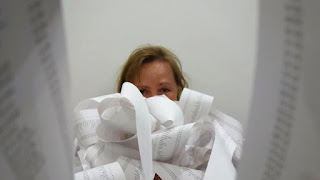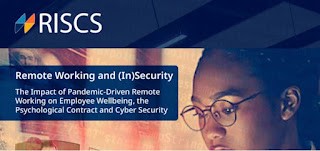This was not my intended thesis…. Dr Pip Thornton
 |
When I started out on the first cohort of CDT students in
2013, my proposed thesis was about military geographies. Influenced both by my
time as a police officer in London, and by a brief but unsettling deployment to
Iraq as a reservist soldier in 2003, I wanted to research how the military is
represented in different physical, cultural and online spaces - specifically
when away from the actual field of battle. Framing this proposal as a security
issue was not difficult, especially as all things ‘cyberwar’ were particularly
hot that year.
It was my first-year summer project that changed all
that. I’d been at a briefing at the Royal United Services Institute (RUSI) on
the national and military security risk posed by the friends and family of
service personnel posting compromising information on social media. Which was
fine, except the phrase that kept being used was not ‘friends and family’, but
‘wives and girlfriends’, which not only erroneously gendered the problem, but
also added a whole load of derogatory cultural baggage relating to ‘WAGs’ and
footballers’ wives. This really annoyed me, so I went away to research the
sexist connotations of the term only to discover that it was impossible to
search for examples of ‘wives and girlfriends’ being used in a ‘sexist’ way, as
the Google search engine automatically changed the word ‘sexist’ to ‘sexiest’.
So instead of feminist cultural critique, my ‘wives and girlfriends sexist’
query returned a list of the ‘hottest’ and ‘sexiest’ footballer’s wives and
links to ‘lads magazines’. From that moment I became fascinated with how
language is manipulated as it passes through the search engine, be that algorithmically,
or by the processes of linguistic capitalism which govern Google’s revenue
generating advertising platforms. Luckily for me, both my supervisors – Pete
Adey in Geography, and Keith Martin in the ISG - agreed that I could completely
change the topic of my thesis and that they would still supervise me.
So my thesis was reborn as an enquiry into the linguistic,
political, and economic side-effects of Google’s search and advertising
platforms, with the Walter Benjamin inspired title ‘Language in the Age of
Algorithmic Reproduction’. It was still about geography, as it focussed on the
circulation of monetised language around the web, and on the location specific
‘value’ of words in different markets. And it was also about cybersecurity –
not in a key-exchange and crypto way (although there is a small amount of
crypto in the project) - but because it exposed how the ability to access
information, and to communicate across digital spaces is necessarily
compromised by the manipulation and exploitation of the language that flows
through them.
This switch to a topic with language at its heart was also
particularly interesting and exciting for me because this final piece of the
theoretical puzzle necessitated a return to my academic home in English Literature
and critical theory such as post-structuralism. More specifically, and as the
project progressed, I began to think of ways to make visible (and explain to my
funders) some of the ideas I was having around Google and language, and what
proved to be a very effective way of doing this was through the medium of
poetry. To begin with, I worked out the monetary value of the words of a
well-known poem as they would appear as keywords in a Google search
advert. I then presented the results as a mocked-up receipt in order
to demonstrate the tension between the ‘poetic’ and ‘economic’ value of
language in an age of algorithmic reproduction. The word ‘cloud’, from William
Wordsworth’s ‘Daffodils’, for example, has a high monetary value to Google,
however its value lies not in a vision of a Cumbrian springtime, but in the
context of ‘cloud’ computing and associated technologies. The poem receipt
therefore provided a means for me to expose the inherent structural and market
logics which almost invisibly govern the words that flow through the search
engine. As time went by, and with the help of fellow CDT students, in
particular the coding expertise of Ben Curtis and Feargus Pendlebury, the
poem-receipt process was semi-automated to allow me to process longer texts, I
bought a second hand receipt printer to print out and frame physical receipts
as artefacts, and the project became a fully-fledged artistic intervention
called {poem}.py.
Since then, I have been lucky enough to present my work at a
range of diverse national and international venues such as the Science Museum,
the Alan Turing Institute, New Media Scotland, and the Transmediale festival of
art and digital culture, as well as at various Geography, Digital Humanities
and Digital Economy events. {poem}.py has gone from strength to strength. The
project was covered by WIRED UK and New Scientist in 2018, and a collection of
framed poem receipts is currently on display at the Open Data Institute in
London as part of a commissioned exhibition on Data as Culture.
I’ve now (finally) finished my thesis, and am now based up
in Edinburgh as a Post-Doc Research Associate in Creative Informatics at
Edinburgh College of Art. I have just secured an Edinburgh Futures Institute
research award which will enable me to realise a long-standing ambition for
{poem}.py. In collaboration with institutions including the National Library of
Scotland, Edinburgh City of Literature, and local galleries, the funding will
scope and prototype a large-scale public artwork version of {poem}.py using
projections onto public spaces and buildings.
Not my intended thesis at all, but I wouldn’t change a
minute of it.


Comments
Post a Comment